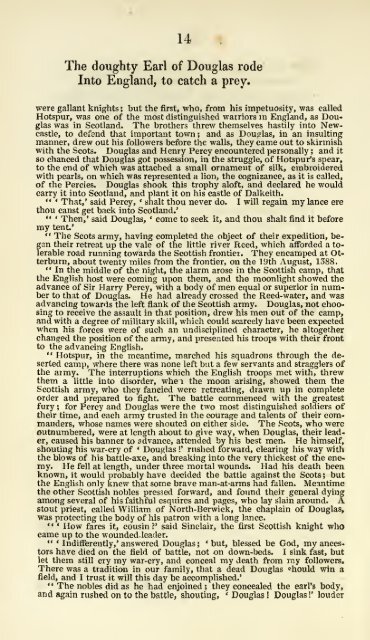The Scottish ballads - National Library of Scotland
The Scottish ballads - National Library of Scotland
The Scottish ballads - National Library of Scotland
You also want an ePaper? Increase the reach of your titles
YUMPU automatically turns print PDFs into web optimized ePapers that Google loves.
14<br />
<strong>The</strong> doughty Earl <strong>of</strong> Douglas rode<br />
Into England, to catch a prey.<br />
were gallant knights ; but the first, who, from his impetuosity, was called<br />
Hotspur, was one <strong>of</strong> the most distinguished warriors in England, as Douglas<br />
was in <strong>Scotland</strong>, <strong>The</strong> brothers threw themselves hastily into Newcastle,<br />
to defend that important town; and as Douglas, in an insulting<br />
manner, drew out his followers before tlie walls, they came out to skirmish<br />
with the Scots. Douglas and Henry Percy encountered personally ; and it<br />
so chanced that Douglas got possession, in the struggle, <strong>of</strong> Hotspur's spear,<br />
to the end <strong>of</strong> which was attached a small ornament <strong>of</strong> silk, embroidered<br />
with pearls, on which was represented a lion, the cognizance, as it is called,<br />
<strong>of</strong> the Percies. Douglas shook this trophy al<strong>of</strong>t, and declared he would<br />
carry it into <strong>Scotland</strong>, and plant it on his castle <strong>of</strong> Dalkeith.<br />
" ' That,' said Percy, • shalt thou never do. I will regain my lance ere<br />
thou canst get back into <strong>Scotland</strong>.'<br />
•• ' <strong>The</strong>n,' said Douglas, ' come to seek itj and thou shalt find it before<br />
my tent.'<br />
" <strong>The</strong> Scots army, having completed the object <strong>of</strong> their expedition, began<br />
their retreat up the vale <strong>of</strong> the little river Reed, which afforded a tolerable<br />
road running towards the <strong>Scottish</strong> frontier. <strong>The</strong>y encamped at Otterburn,<br />
about twenty miles from the frontier, on the 19th August, 1388.<br />
" In the middle <strong>of</strong> the night, the alarm arose in the <strong>Scottish</strong> camp, that<br />
the English host were coming upon them, and the moonlight showed the<br />
advance <strong>of</strong> Sir Harry Percy, with a body <strong>of</strong> men equal or superior in number<br />
to that <strong>of</strong> Douglas. He had already crossed the Reed-water, and was<br />
advancing towards the left flank <strong>of</strong> the <strong>Scottish</strong> army. Douglas, not choosing<br />
to receive the assault in that position, drew his men out <strong>of</strong> the camp,<br />
and with a degree <strong>of</strong> military skill, which could scarcely have been expected<br />
when his forces were <strong>of</strong> such an undisciplined character, he altogether<br />
chang^ed the position <strong>of</strong> the army, and presented his troops with their front<br />
to the advancing English.<br />
" Hotspur, in the meantime, marched his squadrons through the deserted<br />
camp, where there was none left but a few servants and stragglers <strong>of</strong><br />
the army. <strong>The</strong> interruptions which the English troops met with, threw<br />
them a little into disorder, whei the moon arising, showed them the<br />
<strong>Scottish</strong> army, who they fancied were retreating, drawn up in complete<br />
order and prepared to fight. <strong>The</strong> battle commenced with the greatest<br />
fury ; for Percy and Douglas were the two most distinguished soldiers <strong>of</strong><br />
their time, and each army trusted in the courage and talents <strong>of</strong> their commanders,<br />
whose names were shouted on either side. <strong>The</strong> Scots, who were<br />
outnumbered, were at length about to give way, when Douglas, their leader,<br />
caused his banner to advance, attended by his best men. He himself,<br />
shouting his war-cry <strong>of</strong> * Douglas !' rushed forward, clearing his way with<br />
the blows <strong>of</strong> his battle-axe, and breaking into the very thickest <strong>of</strong> the enemy.<br />
He fell at length, under three mortal wounds. Had his death been<br />
known, it would probably have decided the battle against the Scots ; but<br />
the English only knew that some brave man-at-arms had fallen. Meantime<br />
the other <strong>Scottish</strong> nobles pressed forward, and found their general dying<br />
among several <strong>of</strong> his faithful esquires and pages, who lay slain around. A<br />
stout priest, called William <strong>of</strong> North-Berwick, the chaplain <strong>of</strong> Douglas,<br />
was protecting the body <strong>of</strong> his patron v.'ith a long lance.<br />
" • How fares it, cousin?' said Sinclair, the first <strong>Scottish</strong> knight who<br />
came up to the wounded leader.<br />
•' ' Indifferently,' answered Douglas; 'but, blessed be God, my ancestors<br />
have died on the field <strong>of</strong> battle, not on down-beds. I sink fast, but<br />
let them still cry my war-cry, and conceal my death from my followers.<br />
<strong>The</strong>re was a tradition in our family, that a dead Douglas should win a<br />
field, and I trust it will this day be accomplished.'<br />
" <strong>The</strong> nobles did as he had enjoined; they concealed the earl's body,<br />
and again rushed on to the battle, shouting, ' Douglas ! Douglas!' louder

















